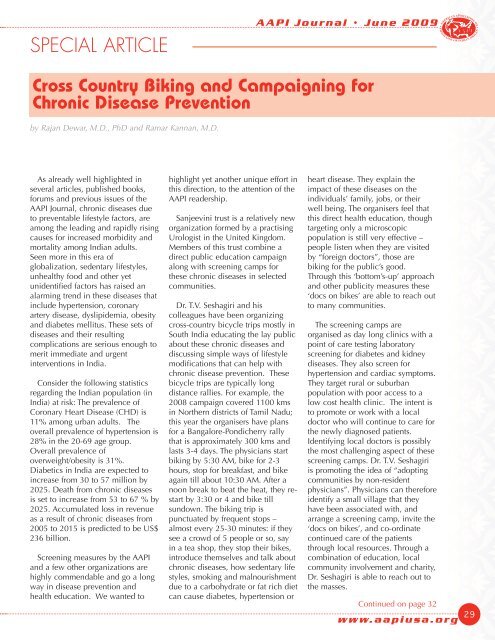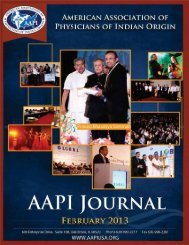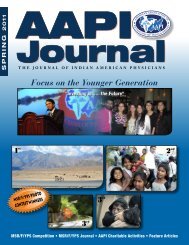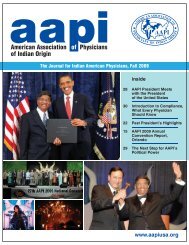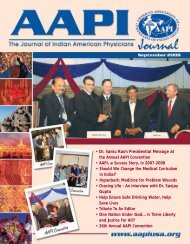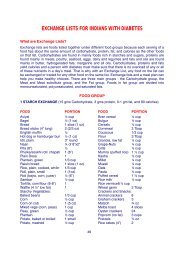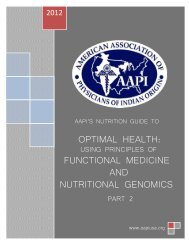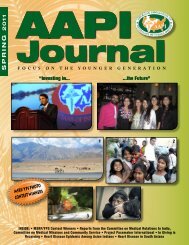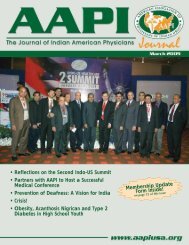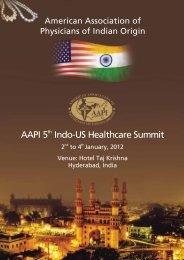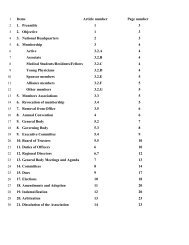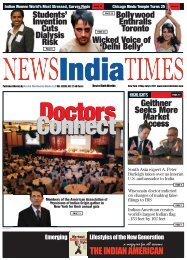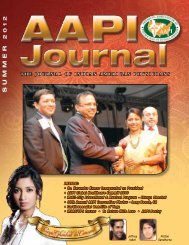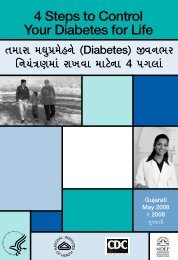Physician Scientist - American Association of Physicians of Indian ...
Physician Scientist - American Association of Physicians of Indian ...
Physician Scientist - American Association of Physicians of Indian ...
You also want an ePaper? Increase the reach of your titles
YUMPU automatically turns print PDFs into web optimized ePapers that Google loves.
SPECIAL ARTICLE<br />
AAPI Journal • June 2009<br />
Cross Country Biking and Campaigning for<br />
Chronic Disease Prevention<br />
by Rajan Dewar, M.D., PhD and Ramar Kannan, M.D.<br />
As already well highlighted in<br />
several articles, published books,<br />
forums and previous issues <strong>of</strong> the<br />
AAPI Journal, chronic diseases due<br />
to preventable lifestyle factors, are<br />
among the leading and rapidly rising<br />
causes for increased morbidity and<br />
mortality among <strong>Indian</strong> adults.<br />
Seen more in this era <strong>of</strong><br />
globalization, sedentary lifestyles,<br />
unhealthy food and other yet<br />
unidentified factors has raised an<br />
alarming trend in these diseases that<br />
include hypertension, coronary<br />
artery disease, dyslipidemia, obesity<br />
and diabetes mellitus. These sets <strong>of</strong><br />
diseases and their resulting<br />
complications are serious enough to<br />
merit immediate and urgent<br />
interventions in India.<br />
Consider the following statistics<br />
regarding the <strong>Indian</strong> population (in<br />
India) at risk: The prevalence <strong>of</strong><br />
Coronary Heart Disease (CHD) is<br />
11% among urban adults. The<br />
overall prevalence <strong>of</strong> hypertension is<br />
28% in the 20-69 age group.<br />
Overall prevalence <strong>of</strong><br />
overweight/obesity is 31%.<br />
Diabetics in India are expected to<br />
increase from 30 to 57 million by<br />
2025. Death from chronic diseases<br />
is set to increase from 53 to 67 % by<br />
2025. Accumulated loss in revenue<br />
as a result <strong>of</strong> chronic diseases from<br />
2005 to 2015 is predicted to be US$<br />
236 billion.<br />
Screening measures by the AAPI<br />
and a few other organizations are<br />
highly commendable and go a long<br />
way in disease prevention and<br />
health education. We wanted to<br />
highlight yet another unique effort in<br />
this direction, to the attention <strong>of</strong> the<br />
AAPI readership.<br />
Sanjeevini trust is a relatively new<br />
organization formed by a practising<br />
Urologist in the United Kingdom.<br />
Members <strong>of</strong> this trust combine a<br />
direct public education campaign<br />
along with screening camps for<br />
these chronic diseases in selected<br />
communities.<br />
Dr. T.V. Seshagiri and his<br />
colleagues have been organizing<br />
cross-country bicycle trips mostly in<br />
South India educating the lay public<br />
about these chronic diseases and<br />
discussing simple ways <strong>of</strong> lifestyle<br />
modifications that can help with<br />
chronic disease prevention. These<br />
bicycle trips are typically long<br />
distance rallies. For example, the<br />
2008 campaign covered 1100 kms<br />
in Northern districts <strong>of</strong> Tamil Nadu;<br />
this year the organisers have plans<br />
for a Bangalore-Pondicherry rally<br />
that is approximately 300 kms and<br />
lasts 3-4 days. The physicians start<br />
biking by 5:30 AM, bike for 2-3<br />
hours, stop for breakfast, and bike<br />
again till about 10:30 AM. After a<br />
noon break to beat the heat, they restart<br />
by 3:30 or 4 and bike till<br />
sundown. The biking trip is<br />
punctuated by frequent stops –<br />
almost every 25-30 minutes: if they<br />
see a crowd <strong>of</strong> 5 people or so, say<br />
in a tea shop, they stop their bikes,<br />
introduce themselves and talk about<br />
chronic diseases, how sedentary life<br />
styles, smoking and malnourishment<br />
due to a carbohydrate or fat rich diet<br />
can cause diabetes, hypertension or<br />
heart disease. They explain the<br />
impact <strong>of</strong> these diseases on the<br />
individuals’ family, jobs, or their<br />
well being. The organisers feel that<br />
this direct health education, though<br />
targeting only a microscopic<br />
population is still very effective –<br />
people listen when they are visited<br />
by “foreign doctors”, those are<br />
biking for the public’s good.<br />
Through this ‘bottom’s-up’ approach<br />
and other publicity measures these<br />
‘docs on bikes’ are able to reach out<br />
to many communities.<br />
The screening camps are<br />
organised as day long clinics with a<br />
point <strong>of</strong> care testing laboratory<br />
screening for diabetes and kidney<br />
diseases. They also screen for<br />
hypertension and cardiac symptoms.<br />
They target rural or suburban<br />
population with poor access to a<br />
low cost health clinic. The intent is<br />
to promote or work with a local<br />
doctor who will continue to care for<br />
the newly diagnosed patients.<br />
Identifying local doctors is possibly<br />
the most challenging aspect <strong>of</strong> these<br />
screening camps. Dr. T.V. Seshagiri<br />
is promoting the idea <strong>of</strong> “adopting<br />
communities by non-resident<br />
physicians”. <strong>Physician</strong>s can therefore<br />
identify a small village that they<br />
have been associated with, and<br />
arrange a screening camp, invite the<br />
‘docs on bikes’, and co-ordinate<br />
continued care <strong>of</strong> the patients<br />
through local resources. Through a<br />
combination <strong>of</strong> education, local<br />
community involvement and charity,<br />
Dr. Seshagiri is able to reach out to<br />
the masses.<br />
Continued on page 32<br />
29<br />
www.aapiusa.org


